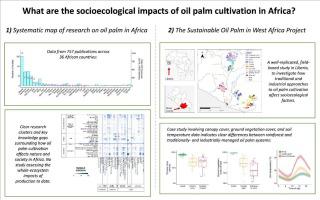当前位置:
X-MOL 学术
›
Sci. Total Environ.
›
论文详情
Our official English website, www.x-mol.net, welcomes your feedback! (Note: you will need to create a separate account there.)
The socioecological benefits and consequences of oil palm cultivation in its native range: The Sustainable Oil Palm in West Africa (SOPWA) Project
Science of the Total Environment ( IF 9.8 ) Pub Date : 2024-03-22 , DOI: 10.1016/j.scitotenv.2024.171850 Michael D. Pashkevich , Cicely A.M. Marshall , Benedictus Freeman , Valentine J. Reiss-Woolever , Jean-Pierre Caliman , Julia Drewer , Becky Heath , Matthew T. Hendren , Ari Saputra , Jake Stone , Jonathan H. Timperley , William Draper , Abednego Gbarway , Bility Geninyan , Blamah Goll , Marshall Guahn , Andrew N. Gweh , Peter Hadfield , Morris T. Jah , Samuel Jayswen , Tiecanna Jones , Samuel Kandie , Daniel Koffa , Judith Korb , Nehemiah Koon , Benedict Manewah , Lourdes M. Medrano , Ana F. Palmeirim , Brogan Pett , Ricardo Rocha , Evangeline Swope-Nyantee , Jimmy Tue , Josiah Tuolee , Pieter Van Dessel , Abraham Vincent , Romeo Weah , Rudy Widodo , Alfred J. Yennego , Jerry Yonmah , Edgar C. Turner
Science of the Total Environment ( IF 9.8 ) Pub Date : 2024-03-22 , DOI: 10.1016/j.scitotenv.2024.171850 Michael D. Pashkevich , Cicely A.M. Marshall , Benedictus Freeman , Valentine J. Reiss-Woolever , Jean-Pierre Caliman , Julia Drewer , Becky Heath , Matthew T. Hendren , Ari Saputra , Jake Stone , Jonathan H. Timperley , William Draper , Abednego Gbarway , Bility Geninyan , Blamah Goll , Marshall Guahn , Andrew N. Gweh , Peter Hadfield , Morris T. Jah , Samuel Jayswen , Tiecanna Jones , Samuel Kandie , Daniel Koffa , Judith Korb , Nehemiah Koon , Benedict Manewah , Lourdes M. Medrano , Ana F. Palmeirim , Brogan Pett , Ricardo Rocha , Evangeline Swope-Nyantee , Jimmy Tue , Josiah Tuolee , Pieter Van Dessel , Abraham Vincent , Romeo Weah , Rudy Widodo , Alfred J. Yennego , Jerry Yonmah , Edgar C. Turner

|
Agriculture is expanding rapidly across the tropics. While cultivation can boost socioeconomic conditions and food security, it also threatens native ecosystems. Oil palm (), which is grown pantropically, is the most productive vegetable oil crop worldwide. The impacts of oil palm cultivation have been studied extensively in Southeast Asia and – to a lesser extent – in Latin America but, in comparison, very little is known about its impacts in Africa: oil palm's native range, and where cultivation is expanding rapidly. In this paper, we introduce a large-scale research programme – the Sustainable Oil Palm in West Africa (SOPWA) Project – that is evaluating the relative ecological impacts of oil palm cultivation under traditional (i.e., by local people) and industrial (i.e., by a large-scale corporation) management in Liberia. Our paper is twofold in focus. First, we use systematic mapping to appraise the literature on oil palm research in an African context, assessing the geographic and disciplinary focus of existing research. We found 757 publications occurring in 36 African countries. Studies tended to focus on the impacts of palm oil consumption on human health and wellbeing. We found no research that has evaluated the whole-ecosystem (i.e., multiple taxa and ecosystem functions) impacts of oil palm cultivation in Africa, a knowledge gap which the SOPWA Project directly addresses. Second, we describe the SOPWA Project's study design and—using canopy cover, ground vegetation cover, and soil temperature data as a case study—demonstrate its utility for assessing differences between areas of rainforest and oil palm agriculture. We outline the socioecological data collected by the SOPWA Project to date and describe the potential for future research, to encourage new collaborations and additional similar projects of its kind in West Africa. Increased research in Africa is needed urgently to understand the combined ecological and sociocultural impacts of oil palm and other agriculture in this unique region. This will help to ensure long-term sustainability of the oil palm industry—and, indeed, all tropical agricultural activity—in Africa.
中文翻译:

油棕原生地种植的社会生态效益和后果:西非可持续油棕 (SOPWA) 项目
整个热带地区的农业正在迅速扩张。虽然种植可以改善社会经济条件和粮食安全,但它也威胁到当地生态系统。泛热带地区种植的油棕 () 是全世界产量最高的植物油作物。油棕种植的影响在东南亚和拉丁美洲得到了广泛的研究,但相比之下,人们对其对非洲的影响知之甚少:非洲是油棕的原生地区,而且种植面积正在迅速扩大。在本文中,我们介绍了一项大型研究计划——西非可持续油棕 (SOPWA) 项目,该项目正在评估传统(即当地人)和工业(即,由一家大型公司)在利比里亚管理。我们的论文有两个重点。首先,我们使用系统制图来评估非洲背景下的油棕研究文献,评估现有研究的地理和学科重点。我们发现 757 种出版物发生在 36 个非洲国家。研究往往侧重于棕榈油消费对人类健康和福祉的影响。我们发现没有研究评估非洲油棕种植对整个生态系统(即多个类群和生态系统功能)的影响,而 SOPWA 项目直接解决了这一知识空白。其次,我们描述了 SOPWA 项目的研究设计,并使用冠层覆盖、地面植被覆盖和土壤温度数据作为案例研究,展示了其在评估雨林和油棕农业地区之间差异方面的实用性。我们概述了 SOPWA 项目迄今为止收集的社会生态数据,并描述了未来研究的潜力,以鼓励在西非开展新的合作和其他类似项目。迫切需要加强对非洲的研究,以了解油棕和其他农业对这个独特地区的生态和社会文化的综合影响。这将有助于确保非洲油棕业以及所有热带农业活动的长期可持续性。
更新日期:2024-03-22
中文翻译:

油棕原生地种植的社会生态效益和后果:西非可持续油棕 (SOPWA) 项目
整个热带地区的农业正在迅速扩张。虽然种植可以改善社会经济条件和粮食安全,但它也威胁到当地生态系统。泛热带地区种植的油棕 () 是全世界产量最高的植物油作物。油棕种植的影响在东南亚和拉丁美洲得到了广泛的研究,但相比之下,人们对其对非洲的影响知之甚少:非洲是油棕的原生地区,而且种植面积正在迅速扩大。在本文中,我们介绍了一项大型研究计划——西非可持续油棕 (SOPWA) 项目,该项目正在评估传统(即当地人)和工业(即,由一家大型公司)在利比里亚管理。我们的论文有两个重点。首先,我们使用系统制图来评估非洲背景下的油棕研究文献,评估现有研究的地理和学科重点。我们发现 757 种出版物发生在 36 个非洲国家。研究往往侧重于棕榈油消费对人类健康和福祉的影响。我们发现没有研究评估非洲油棕种植对整个生态系统(即多个类群和生态系统功能)的影响,而 SOPWA 项目直接解决了这一知识空白。其次,我们描述了 SOPWA 项目的研究设计,并使用冠层覆盖、地面植被覆盖和土壤温度数据作为案例研究,展示了其在评估雨林和油棕农业地区之间差异方面的实用性。我们概述了 SOPWA 项目迄今为止收集的社会生态数据,并描述了未来研究的潜力,以鼓励在西非开展新的合作和其他类似项目。迫切需要加强对非洲的研究,以了解油棕和其他农业对这个独特地区的生态和社会文化的综合影响。这将有助于确保非洲油棕业以及所有热带农业活动的长期可持续性。



























 京公网安备 11010802027423号
京公网安备 11010802027423号